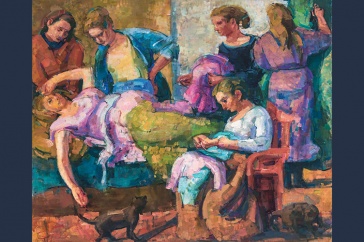

When a scholarship made Art Grant’s dream of a college education come true, he took full advantage of the opportunity. Joining the staff of The New Hampshire, he gained his first experience in journalism, a career he would pursue for many years.
At UNH, Art met Lovertia Anne (Dee) Chase ’68, who left school to marry him in December 1951. He served in the Air Force during the Korean War, and later in the Air Force Reserve and the Air National Guard. He returned to UNH in 1963, working first in public relations and then as special assistant to two presidents and as director of administrative services before becoming secretary of the University System of New Hampshire (USNH). At the same time, Dee resumed her studies, earning her degree while raising the couple’s four children. “Art was often the silent guiding hand which kept things working for UNH and USNH, without notice or fanfare,” says friend Bradford Cook ’70, a Manchester attorney.
In remarks delivered at Art’s funeral, former USNH chancellor Ed MacKay recalled that he also served three terms on the Durham town council, always pitching in on town events and seeing them through to completion.
Colleagues on the town council and at UNH appreciated Art’s sense of humor as well as his work ethic. When the council named his favorite dog-walking route the W. Arthur Grant Circle, “Several of us congratulated him on the recognition,” Ed recalls. Art’s response was, “It’s no big deal, a circle is a road to nowhere!”
Lighthearted jokes were Art’s way of helping build a sense of community at UNH. Many mornings he sat in the Dunlap Center, the former USNH office out on Route 4, chatting with friends. Other friends “would enter that sacred space at the risk of being subject to some good-natured comments,” says Ed, adding that Art’s gentle teasing reinforced the sense of them all being part of an organizational family.
Art’s courtly manners toward women sometimes seemed at odds with the programs he established to encourage women to pursue nontraditional careers, says daughter Rebecca McCutcheon. She remembers him advising her, “Never let anyone tell you that you can’t do something just because you’re a woman!” even as he was helping her with her coat. “We may never have entirely broken him of calling women ‘gals,’” she says, “but he turned out to be pretty feminist when it mattered.”
Together with Dee, who died in 2015, Art raised three daughters, Rebecca, Jennifer ’82 and Jeannie Crocker ’78, as well as a son, the late William A. Grant Jr. ’81. He enjoyed caring for their circa 1860s New England home, but painting one side of the structure per painting season was “like painting the Eiffel Tower,” jokes his son-in-law Dave McCutcheon — especially since he didn’t accept help beyond stabilizing a ladder. “It was almost as if your helping him would get the job done sooner than he wanted.”
The mischievous side that Art’s colleagues so enjoyed stayed with him after he and Dee moved to Havenwood Heritage Heights, a Concord retirement community. Among his pranks was gifting a neighbor with a Christmas decoration that Jeannie says could most charitably be called “unusual.” After making sure his friend was away, Art went to his porch, unfurled the lighted spiral tube that vaguely resembled a Christmas tree, and gleefully plugged it in.
Art died on Aug. 2, 2019. In a memoir left for his family, he wrote about the “tree” and other hijinks, adding that “Jeannie was extremely concerned that Mom and I would get booted out of the retirement community.” Reverend Michelle DeCoste, Havenwood’s director of spiritual care and education and one of the ministers at Art’s funeral, assured the gathering that he was beloved by the staff and that would never have happened. “He noticed those who worked hard and engaged those who are usually in the background,” she said. “He paid attention to those who did not get their due and showered them with his love and attention.”
That was quintessential Art, building a sense of community to the end.
-
Written By:
Karen Tongue Hammond '64 | UNH Magazine



















































